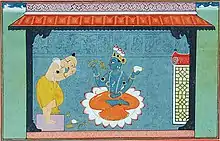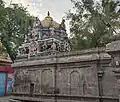| Sundararaja Perumal Temple, Salem | |
|---|---|
 | |
| Religion | |
| Affiliation | Hinduism |
| Deity | Sundararaja Perumal (Vishnu) Sundaravalli Thayar (Lakshmi) |
| Location | |
| Location | Salem |
| State | Tamil Nadu |
| Country | India |
 Shown within Tamil Nadu | |
| Geographic coordinates | TN 11°39′N 78°09′E / 11.65°N 78.15°E |
| Architecture | |
| Type | Dravidian architecture |
| Creator | Cheras, Cholas, Pandyas and Pallavas |
| Part of a series on |
| Vaishnavism |
|---|
 |
Sundararaja Perumal Temple, Salem (also known as Kottai Perumal Koil) is located on the banks of the Thirumanimutharu river at Salem, Tamil nadu, India.[1] The temple is Classified one among the 108 Abhimana Kshethram of Vaishnavate tradition. The other significance of the temple is that it is one of the Pancha Kshethram where Maha Lakshmi was born as Bhargavi- the daughter of Maharishi Bhrigu. The other four temples of the Pancha Kshethram are Sarangapani temple, Kumbakonam, Oppiliappan temple, Nachiyar Koil and Venkateswara Temple, Tirumala.[1] The temple is believed to be of significant antiquity with contributions at different times from Medieval Cholas, Vijayanagara Empire, Chera, Pandyas and Madurai Nayaks. The temple follows Vaikhanasa agama and the temple priests perform the pooja rituals during festivals and on a daily basis. The priests belong to the Vadakalai sect of Vaishnavism, a Brahmin sub-caste. The temple rituals are performed six times a day: Ushathkalam at 7 a.m., Kalasanthi at 8:00 a.m., Uchikalam at 12:00 p.m., Sayarakshai at 6:00 p.m., Irandamkalam at 7:00 p.m. and Ardha Jamam at 10:00 p.m. Each ritual has three steps: alangaram (decoration), neivethanam (food offering) and deepa aradanai (waving of lamps) for both Ranganatha Perumal and Ranganayagi. During the last step of worship, nagaswaram (pipe instrument) and tavil (percussion instrument) are played, and religious instructions in the Vedas (sacred text) are recited by priests.[1]
Legend
As per Hindu legend, the Vaishnava deity, Sundararaja, an incarnation of Hindu god Vishnu, appeared for Bhrigu Rishi, who performed penance in the bank of Thirumanimuthar.[2] The sage did not get the attention of Vishnu and in his anger, he kicked Vishnu on his chest. Mahalakshmi who resides in Vishnu's chest got angered as Vishnu did not show his anger towards the sage. She left Vaikunta and reached earth and took the form of Padmavathy. Vishnu followed her and married her. Padmavathy got her memories and was still angry with Vishnu. The sage Bhrigu sought his apology and requested Mahalakshmi to be born to him as Sundaravalli in his next birth. The sage was born as Bhrigu rishi again and performed penance to attain Mahalakshmi as his daughter.[2] Vishnu was pleased by the penance and he wished the sage to get Lakshmi as his daughter.One day, he found a girl under a Tulasi plant in a garden in his Ashramam and was so beautiful thus named her Sundaravalli Which means the Beautiful girl. Vishnu descended to earth as Sundararajan. He convinced Lakshmi to marry him and the couple eventually got married.[3]
 Entrance of the Mandapa dedicated to Vishnu
Entrance of the Mandapa dedicated to Vishnu Thulasi madam where Sundaravalli is said to be taken by Bhrigu Maharishi
Thulasi madam where Sundaravalli is said to be taken by Bhrigu Maharishi
History
The Temple is constructed in various periods by various kings. It is said that all the three main kingdoms Chera, Chola and Pandya's had worshiped this Lord with intense faith. There are beautiful sculptures in the temple walls and is very famous temple for the celebration of Vaikuntha Ekadashi.[4]
The temple is maintained and administered by the Hindu Religious and Charitable Endowments Department of the Government of Tamil Nadu.[5]

Architecture
The temple has beautiful sculptured pillars and there are many carving's of monkeys on the ceilings of the temple. It is one of the most oldest temples of the district and has 4 huge Mandapas one for Lord Krishna and other two for Perumal and Thayar. Apart from the shrines of Sundararaja Perumal and Sundaravalli Thayar there are separate shrines for Venugopla Krishnaswamy, Kothandaramaswamy, Santhana gopala Krishna, Chakrathazhwar, Andal, Alvars and Vaishnavate Acharyars. The temple has a huge Mirror Mandapa just like Srivilliputhur Andal temple.[3] There is a small garden where story's of Bhagavata Purana are portrayed in garden like surrounding and also has paintings of Ramayana and Mahabharatha. The temple has the swarga vasal which opens once a year during Vaikuntha Ekadashi.[6]
 Sculpture of monkey on the temple
Sculpture of monkey on the temple Sundararaja Perumal's Vimanam
Sundararaja Perumal's Vimanam Sundaravalli Thayar's Vimanam
Sundaravalli Thayar's Vimanam
Religious significance
It is considered as an Abhimana sthalam of Lord Vishnu and one of the Pancha Kshethram Where Maha Lakshmi was born as Bhargavi- the daughter of Maharishi Bhrigu. The rest four temples of the Panch Kshethram are Sarangapani temple, Kumbakonam, Oppiliappan temple, Nachiyar Koil and Venkateswara Temple, Tirumala. This temple is one of the most important temples of the Sri Vaishnavism sect of Hinduism. It is considered that Lord Hanuman had worshipped Sundararaja Perumal and also performed penance to become the next Brahma.[2] There is a huge Statue of Lord Hanuman of 8 feet next to the Kodimaram.
Festivals and religious practices
The temple priests perform the pooja (rituals) during festivals and on a daily basis. As at other Vishnu temples of Tamil Nadu, the priests belong to the Vaishnavaite community, a Brahmin sub-caste. The temple rituals are performed six times a day: Ushathkalam at 7 a.m., Kalasanthi at 8:00 a.m., Uchikalam at 12:00 p.m., Sayarakshai at 6:00 p.m., Irandamkalam at 7:00 p.m. and Ardha Jamam at 10:00 p.m. Each ritual has three steps: alangaram (decoration), neivethanam (food offering) and deepa aradanai (waving of lamps) for both Sundararaja Perumal and Sundaravalli Thayar. During the last step of worship, nagaswaram (pipe instrument) and tavil (percussion instrument) are played, religious instructions in the Vedas (sacred text) are recited by priests, and worshippers prostrate themselves in front of the temple mast. There are weekly, monthly and fortnightly rituals performed in the temple. The temple priests celebrate several festivals throughout the year. The main festival celebrated in this sacred temple is Vaikunta Ekadashi.[6] Some other festivals which are celebrated by the temple priests include: Rama navami, Krishna janmashtami, Thiru aadipooram, Akshyathritheeya, Pavithrotsavam, Brahmotsavam, Puratasi, Navaratri, Pagal pathu, Ra pathu and Deepavali.[7] Another special occasion in the Temple is Thirukalyanam of Andal.
 Utsava murti of Venugopalaswamy shrine of the temple during the festival Krishnajanmashtami
Utsava murti of Venugopalaswamy shrine of the temple during the festival Krishnajanmashtami Vedic sacrifice called Homam in the Temple
Vedic sacrifice called Homam in the Temple
References
- 1 2 3 https://www.maalaimalar.com/news/district/in-fort-perumal-templeonline-booking-for-special-darshan-554269
- 1 2 3 "Sri Azhagirinathar temple". Dinamalar. Retrieved 9 April 2017.
- 1 2 "Salem Alagirinathar Temple Timings, History". templesinindiainfo. Retrieved 9 April 2017.
- ↑ https://tamil.abplive.com/spiritual/salem-vaikunda-ekadasi-special-vaipavam-was-held-at-kottai-alagirinathar-temple-tnn-94092
- ↑ Hindu Religious and Charitable Endowments Act, 1959
- 1 2 https://tamil.samayam.com/latest-news/salem/vaikunta-ekadasi-festival-celebrated-in-salem-kottai-alagirinathar-temple/articleshow/79952021.cms
- ↑ https://tamil.samayam.com/latest-news/salem/sita-kalyana-ceremony-was-held-at-salem-kottai-alagirinathar-temple-on-occasion-of-rama-navami/articleshow/90893539.cms